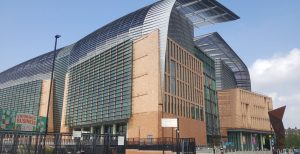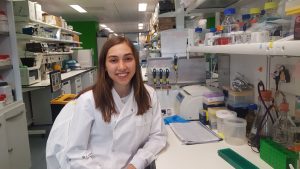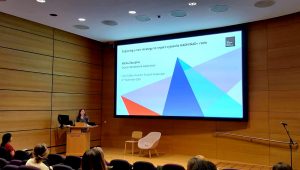Research internship at the Francis Crick Institute
Summer 2021 has flown by. I had the incredible opportunity to spend 9 weeks at the Francis Crick Institute, as part of the Crick-Calleva Summer Student Programme. I worked in the Cancer Metabolism Laboratory, led by Dr Dimitrios Anastasiou, under the supervision of the postdoctoral fellow Dr Agustin Asuaje; my project was entitled “Developing a new strategy to report cytosolic NADH/NAD+ ratio”.
It was a real privilege to be alongside pioneering scientists sharing the Crick’s top-notch research facilities, while trying to develop a reporter of the redox status of the cell! I can’t believe how much I have learnt over 9 weeks, both inside and outside the lab.

The Francis Crick Institute is a leading-edge biomedical research centre in central London.
Inside the lab…
On the one hand, inside the lab, I developed practical skills in different areas, including: cell culture and transfection, flow cytometry, bacterial culture and plasmid DNA isolation, LC-MS and GC-MS (Liquid/Gas Chromatography coupled to Mass Spectrometry). By the end of the internship I was able to design, carry out, analyse, and present my own experiments. I think that my “secret” for achieving so much lies in constantly following these three steps:
- Observing my supervisor Agustin, taking notes and asking questions
- Trying myself for the first time with Agustin beside me, and asking him more questions
- Working independently in the lab – and asking my supervisor for any doubt!
The reality of bench-work
One of my happy discoveries this summer was that I enjoy bench-work, although I must note that it can be quite time-consuming and repetitive. For instance, the protocol for processing samples for GC-MS was one of the longest, stretching over 3 days – this also meant that that careful calendarization was necessary.
While I believe that my practical lab skills have dramatically advanced since the start, I’m aware that there is still so, so much room for improvement. In particular, I tend to be very slow, too slow… One of my goals is to find the right balance for correctly performing the steps of a protocol: neither rushing through it nor being overly perfectionist about it.
Experiments failing was another reality which I had to deal with this summer. I had always been told how research often doesn’t go as expected, but this summer I experienced it first-hand. Quite a few of my experiments failed, either
- because I made a mistake – for example, I compromised one of my first experiments because I lifted too many cells when handling them (293T cells are very delicate!), or
- because I was working on something new! The project kicked off when I joined the lab, so I was not trying to replicate previous results using a previously established assay… On the contrary, part of my time was dedicated to repeating assays in order to find the optimal experimental conditions.
The important part was to not take failure personally, but to seek what could be learnt from it instead.

Big smiles in the lab 🙂
Outside the lab…
On the other hand, outside the lab, I’m grateful for seeing and experiencing everyday life as a researcher at the Crick Institute. The Cancer Metabolism Laboratory kindly welcomed me in their team. I had the opportunity to meet passionate scientists and ask for their advice and insight on careers prospects and skills. Also, by working alongside PhD students, I realised the importance of thinking twice before jumping into a PhD after graduating; it’s paramount to be truly motivated and to have a good relationship with your supervisor.
Presenting my work
One of the most challenging tasks this summer was preparing and giving my lab meeting: I was a bit nervous about presenting my work to researchers with much greater experience than me. Bringing my work together was initially quite tough; I really appreciated my supervisor’s help in structuring the background and introduction to my project. Despite these difficulties, presenting my work was also one of the most rewarding experiences: during my (almost 2h long!) lab meeting I felt that my work was valued and discussed as that of any other member of the research team.
Like the lab meeting, the final Summer Student Symposium was another excellent chance for building on my presentation skills. The penultimate day of the internship was dedicated to wrapping up the summer experience: all 16 students on the programme had 10 minutes to present their work, plus time to take questions. This was also a great opportunity to hear about other research questions pursued at the Crick – and I must admit that I’m always amazed by the vastity of the research world.

Presenting at the Summer Student Symposium
A future in cancer research?
Finally, this work experience has led me to reflect on my scientific interests and future plans. I’ve decided that I would like to further specialise in cancer research: I’m keen on learning more about therapeutic resistance, the tumour microenvironment, immuno-oncology, cancer metabolism, and many other topics… Also, I’ve become more confident about trying to apply for a PhD after graduating; I can imagine myself as a researcher in academia in the future, but it’s definitely (and luckily) too early to tell!
Take home messages from this amazing experience:
- Research takes many long hours –> organisation is the key
- Experiments fail (truly, this happened quite often over my 9 weeks)
- Doing a PhD is not easy… but I’m pretty sure about undertaking one after graduating
- Working well with your supervisor makes a huge difference – in fact, a massive thank you goes to my supervisor Agustin, who has patiently taught me so much!!
Next research project…
My next chance to build on my experience as a scientist is coming soon: in October I will start my Year 3 research project. During the summer I had the chance to learn more of the leading-edge cancer research carried out at the Crick. That’s why I tried to get in touch with other group leaders in the Institute to undertake my undergraduate research project in their lab, and… Dr Erik Sahai has kindly offered me the opportunity to work in his Tumour Cell Biology Laboratory! I’m very excited (and naturally a bit worried!) about this new adventure; I look forward to gaining great insight cancer biology and a different perspective in the research world.
yuka.mori.20 30th June 2022 - 2:45 pm
Hello, I am sorry for my sudden message.
My name is Yuka Mori and I am studying Bsc. Neuroscience(2nd year in 2022/2023) at University College London. I hope to continue studying Neuroscience and pursue research in the future.
I encountered your blog when researching on summer lab experience in the Francis Crick institute. I was inspired by how you have reflected on your lab experience, and applied that experience to consolidate your future research plans.
I would be glad if I could ask several questions regarding your laboratory experience at the Francis Crick institute and about your journey to pursuing PhD.
I am sorry for this message out of the blue, but I would be happy if I could receive some reply.
Sincerely,
Yuka Mori
Marta Zaccaria 16th August 2022 - 10:52 am
Hi Yuka, thank you for getting in touch!
I would be glad to share more about my experience with you. Please feel free to write me at marta.zaccaria.19@ucl.ac.uk.
All the best,
Marta